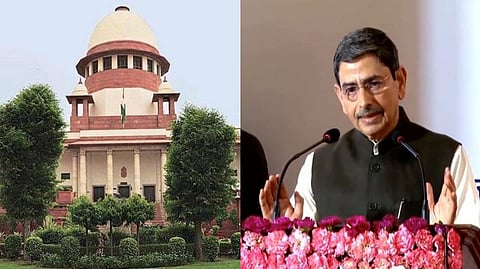

NEW DELHI: The Supreme Court, in its verdict on Tuesday, held that the Tamil Nadu Governor RN Ravi’s action of reserving 10 bills for the President was "illegal and erroneous," and thus, the action was set aside.
"All actions taken by the governor in relation to the 10 bills are set aside. The 10 bills shall be deemed to have been cleared from the date they were re-presented to the governor," said a two-judge bench of the apex court, led by Justice JB Pardiwala, and comprising Justice R Mahadevan.
"The governor must assent to a bill when it is presented to him after re-consultation in the state assembly. He can only refuse assent if the bill is different," the court added.
The top court also observed that any steps taken by the President on the 10 bills were non-est (null and void) under the law.
It laid down timelines for Governors' decisions under Article 200 on bills passed by they Assembly. The bench further stated that the Governor must act on the aid and advice of the Council of Ministers..
The verdict followed a plea filed by the Tamil Nadu government against Governor RN Ravi for withholding assent on several bills passed by the state legislature and for constituting search-and-selection committees for the appointment of Vice-Chancellors at three universities.
'No scope for governor to simply withhold assent'
In its ruling, the apex court clarified that once the Governor withholds assent, he is obligated to follow the procedure outlined under the first proviso, which mandates action "as soon as possible."
"The governor cannot sit on bills and exercise a pocket veto over them. There must be a sense of expediency. There is no scope for the governor to simply withhold assent. Under Article 200, the bills passed by the state are supposed to have the authority of an act, and without this assent, the bills are just documents of aspirations that do not come into effect," Justice Pardiwala said in the judgment.
The court also set prescribed timelines regarding the issue of bills.
The timeline is a maximum of one month for withholding assent and reserving the bills for the President, with the aid and advice of the Council of Ministers. If the assent is withheld without the aid and advice of the Council of Ministers, the bill must be returned within three months. Finally, in the case of a bill presented after reconsideration by the state assembly, the Governor must assent to the bill within one month.
The Supreme Court emphasised that failure to adhere to these timelines will invite judicial scrutiny.
Earlier, during the hearings, the Supreme Court had questioned Tamil Nadu Governor about withholding assent to the bills. The Court asked why, if the bills were repugnant to central laws, the Governor had not immediately communicated this to the state government.
"If the Governor found the bills repugnant, he should have immediately brought it to the notice of the government, which could have reconsidered the bills for further action," the bench observed.
The Court noted that an "impasse" had been created, as the President had returned the bills, stating they were repugnant. It clarified that the Court would examine the legal standing on the issue of whether the bills were indeed repugnant and would decide if necessary.
During the hearings, the Supreme Court also emphasised that under Article 200 of the Constitution, the Governor is obligated to return bills to the Assembly for reconsideration if repugnance is found.
'No obligation to return the bills'
Defending the Governor's stance, Attorney General (AG) R Venkataramani, representing the Governor, argued that once the Governor sends the bills to the President, and the President withholds assent, there is no obligation to return the bills to the Assembly.
"What happens to the Presidential assent? Will the President be asked why he didn’t give assent, or did he concur? This is nothing but a political thicket," Venkataramani had argued. He had also clarified that Article 200 does not specify a time period in which the Governor must act.
The Governor has multiple options under Article 200, including withholding assent or referring the bills directly to the President. "Once assent is withheld, the bills fall, and there is no obligation to return them to the Assembly," Venkataramani argued.
The Supreme Court, while stressing the need for a solution to the deadlock between the State Government and the Governor's office, called for the establishment of a framework or mechanism to resolve such issues expediently.
The Tamil Nadu Government's petition had highlighted that files related to the premature release of prisoners, the appointment of the TNPSC chairman and members, and the bill related to the removal of the Governor from the post of Vice-Chancellor at various universities, among others, were pending approval from the Governor.